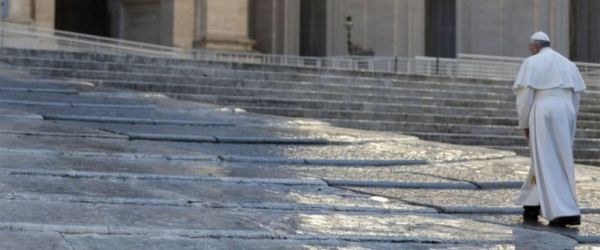This Sunday’s Gospel reading (cf. Mk 10:2-16) offers us Jesus’ words on marriage. The passage opens with the provocation of the Pharisees who ask Jesus if it is “lawful for a man to divorce his wife”, as the Law of Moses provides (cf. vv. 2-4). Jesus firstly, with the wisdom and authority that come to him from the Father, puts the Mosaic prescription into perspective, saying: “For your hardness of heart he” — that is, the ancient legislator — “wrote you this commandment” (v. 5). Thus it is a concession that is needed to mend the flaws created by our selfishness, but it does not correspond to the Creator’s original intention.
And here, Jesus again takes up the Book of Genesis: “from the beginning of creation, ‘God made them male and female’. ‘For this reason a man shall leave his father and mother and be joined to his wife, and the two shall become one’” (vv. 6-8). And he concludes: “What therefore God has joined together, let not man put asunder” (v. 9). In the Creator’s original plan, it is not that a man marries a woman and, if things do not go well, he repudiates her. No. Rather, the man and the woman are called to recognize each other, to complete each other, to help each other in marriage.
This teaching of Jesus is very clear and defends the dignity of marriage as a union of love which implies fidelity. What allows the spouses to remain united in marriage is a love of mutual giving supported by Christ’s grace. However, if in the spouses, individual interests, one’s own satisfaction prevails, then their union cannot endure.
And the Gospel passage itself reminds us, with great realism, that man and woman, called to experience a relationship of love, may regretfully behave in a way that places it in crisis. Jesus does not admit all that can lead to the failure of the relationship. He does so in order to confirm God’s plan, in which the power and beauty of the human relationship emerge. The Church, on the one hand, does not tire of confirming the beauty of the family as it was consigned to us by Scripture and by Tradition; at the same time, she strives to make her maternal closeness tangibly felt by those who experience relationships that are broken or that continue in a difficult and trying way.
God’s way of acting with his unfaithful people — that is, with us — teaches us that wounded love can be healed by God through mercy and forgiveness. For this reason in these situations, the Church is not asked to express immediately and only condemnation. On the contrary, before so many painful marital failures, she feels called to show love, charity and mercy, in order to lead wounded and lost hearts back to God.
Let us invoke the Virgin Mary, that she help married couples to always live and renew their union, beginning with God’s original Gift.
[Pope Francis, Angelus 7 October 2018]












